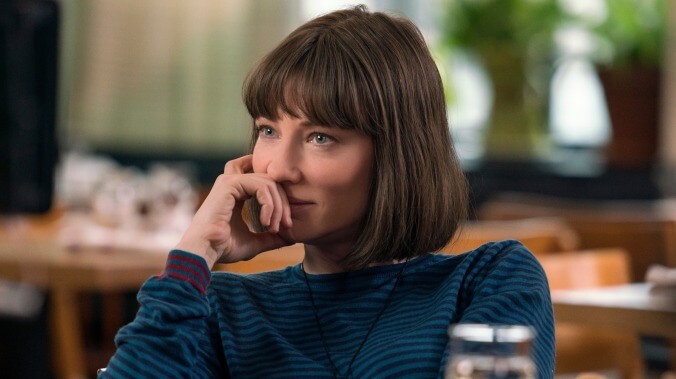In a rare misstep, Richard Linklater botches his take on the bestselling Where’d You Go, Bernadette


Maria Semple’s Where’d You Go, Bernadette is a clever novel, full of well-drawn characters and powered by a compelling mystery, all of which suggests that it could be made into a strong movie. But the book’s entertainment value does an impressive job disguising its logistical challenge to anyone looking to adapt it for the screen: a partially epistolary approach that offers multiple points of view and, for some stretches, more psychology and gossip than action. Though the material doesn’t have much in common with the work of Steven Soderbergh, he’s the kind of filmmaker who might perk up at the opportunity to meet those challenges—and maybe feel a kinship with the character of Bernadette, self-described as a “great problem solver.”
Richard Linklater, the director/co-writer who has stewarded a film version of Bernadette, is not exactly a great problem solver. Unlike the exacting and sometimes high-strung architect Bernadette (Cate Blanchett), he’s gently inquisitive, making movies more temperamentally suited to Bernadette’s brilliant but soft-spoken programmer husband, Elgin (Billy Crudup). Linklater has Soderbergh’s experimental curiosity but a more relaxed, spontaneous-feeling methodology. That doesn’t make him necessarily wrong for this adaptation; for a while, he even feels like an inspired choice to navigate the complicated family dynamics of Bernadette, Elgin, and their teenage daughter, Bee (Emma Nelson).
The trio has made their home in Seattle occupying a fixer-upper of a house that Bernadette has never finished fixing up. She was once an architect of great renown, but has become a semi-shut-in, reluctant to join the parental fray at Bee’s private school and managing her life through an unseen remote personal assistant named Manjula. Bee is accepting of her mom’s prickliness (never directed toward her beloved daughter), and happily sides with her whenever, say, a fussy next-door neighbor and fellow mom like Audrey (Kristen Wiig) extrapolates slights and feuds from Bernadette’s exasperated indifference (which, as in the book, is perhaps not quite as devastatingly witty as the text seems to think). Linklater has a lot of backstory and character details to contend with, and finds some clever solutions, like an online video that explains Bernadette’s greatest professional triumph (and a related devastation). And Blanchett is ideally cast as someone both “challenged in the art of basic interaction” and secretly self-conscious about her limitations; even when she threatens to get into an affectation-off with Wiig, Linklater’s chilled-out refusal to indulge caricatures keeps the characters grounded.
Elgin, who has willingly channeled his own genius into a job at Microsoft, worries about Bernadette’s mental state, especially once she (reluctantly) agrees to Bee’s long-standing request for a family trip to Antarctica. Here the story arrives at its most important turn: Bernadette, beset with social and familial pressure, makes a quick and mysterious exit, leaving her husband and daughter puzzled and adrift. At this point, Linklater and his co-writers (or maybe Linklater and his longtime editor Sandra Adair) make a crucial change from the book, not in the plot but how it proceeds. Without getting into spoiler territory, suffice to say that this version jettisons most of the obsessive speculation and detective work that follows Bernadette’s disappearance in the novel—a disastrous alteration that smacks of damage control.
There’s nothing wrong with deviating from source material, but this desperate and ineffective solution to the material’s interiority will make the film version of Bernadette seem even more anticlimactically baffling to those who haven’t read the book. Readers will at least understand why this story exists in the first place. But even in the more successful first half of the movie, there are signs that Linklater has failed to crack the work as a whole. Certain plot details are faithfully introduced but don’t escalate, diminishing both the movie’s comic energy and its dramatic tension. One pivotal scene involves an accidental mudslide that destroys a fancy fundraising party for Bee’s private school, and Linklater seems to have no idea how to stage it. Should it play as satisfying revenge over the smug private-school moms? Comic destruction that goes too far? A genuine disaster? Linklater chooses none of the above, and cuts away from the scene rather than imposing any kind of tone on it.
However small that decision, it’s indicative of the strange ways that Where’d You Go, Bernadette, a movie about upper-middle-class strife, seems determined to avoid any truly unpleasant confrontation. (Several messier details from the book are scrubbed away.) Maybe it’s Linklater’s sense of empathy, so often key to his work, misfiring on him. To his credit, it probably would have been easy to turn this particular book into a quasi-satirical parade of withering takedowns. Turning it into a flavorless, center-less journey of self-discovery was likely a lot more work. That doesn’t make it any easier to watch.